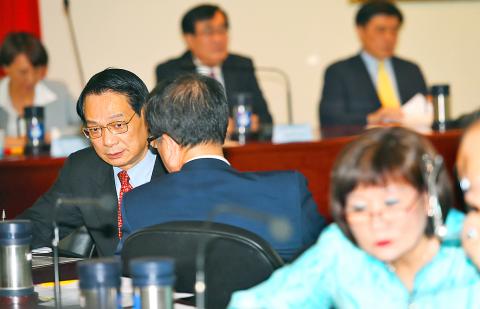Chinese Nationalist Party (KMT) Chairman Eric Chu (朱立倫) yesterday rejected the idea that the party ignore its primary system and draft a candidate to run in next year’s presidential election, party spokesperson Lin Yi-hua (林奕華) said.
KMT Legislator Lu Hsueh-chang (呂學樟) and other KMT Central Standing Committee members suggested during yesterday’s weekly meeting that the party rely solely on polls to decide whom to nominate for the January election.
Lu suggested that Chu, Legislative Speaker Wang Jin-pyng (王金平), Vice President Wu Den-yih (吳敦義) and Deputy Legislative Speaker Hung Hsiu-chu (洪秀柱) be listed as possible candidates and that the party’s ticket be based on who places first and second in the polls.

Photo: Chang Chia-ming, Taipei Times
The KMT’s primary rules stipulate that the party can only draft a candidate when the hopefuls who have met the signature collection threshold fail to be backed by more than 30 percent of respondents in a poll comparing them with the Democratic Progressive Party’s (DPP) presidential nominee, held as the second stage of the primary process.
Hung was one of only two party members who registered for the presidential primary.
However, she was the only one whose valid signature collection met the required threshold.
At present, Hung would be the only KMT member pitted against DPP Chairperson Tsai Ing-wen (蔡英文), her party’s presidential candidate.
Lu said he was worried that such a poll could be rigged by Tsai’s supporters because they would like to see Hung win the KMT nomination.
Another suggestion was made that if such a poll is to be conducted, pan-green camp supporters should be excluded, Lin said.
Lu’s proposal was not accepted by the committee after Chu urged the party to unite behind its primary system and not to take a pre-determined stance, Lin said.
According to a survey by the Chinese-language China Times newspaper, 34 percent of the respondents said they would vote for Hung in January’s election.
Hung said that although she did not think it would be easy to meet the requirement of winning more than 30 percent support in a head-to-head poll against Tsai, the suggestions by the Central Standing Committee members seeking alternative candidates would “spur” her efforts to win support from the public, especially those voters in southern Taiwan.

AIR SUPPORT: The Ministry of National Defense thanked the US for the delivery, adding that it was an indicator of the White House’s commitment to the Taiwan Relations Act Deputy Minister of National Defense Po Horng-huei (柏鴻輝) and Representative to the US Alexander Yui on Friday attended a delivery ceremony for the first of Taiwan’s long-awaited 66 F-16C/D Block 70 jets at a Lockheed Martin Corp factory in Greenville, South Carolina. “We are so proud to be the global home of the F-16 and to support Taiwan’s air defense capabilities,” US Representative William Timmons wrote on X, alongside a photograph of Taiwanese and US officials at the event. The F-16C/D Block 70 jets Taiwan ordered have the same capabilities as aircraft that had been upgraded to F-16Vs. The batch of Lockheed Martin

US President Donald Trump yesterday announced sweeping "reciprocal tariffs" on US trading partners, including a 32 percent tax on goods from Taiwan that is set to take effect on Wednesday. At a Rose Garden event, Trump declared a 10 percent baseline tax on imports from all countries, with the White House saying it would take effect on Saturday. Countries with larger trade surpluses with the US would face higher duties beginning on Wednesday, including Taiwan (32 percent), China (34 percent), Japan (24 percent), South Korea (25 percent), Vietnam (46 percent) and Thailand (36 percent). Canada and Mexico, the two largest US trading

GRIDLOCK: The National Fire Agency’s Special Search and Rescue team is on standby to travel to the countries to help out with the rescue effort A powerful earthquake rocked Myanmar and neighboring Thailand yesterday, killing at least three people in Bangkok and burying dozens when a high-rise building under construction collapsed. Footage shared on social media from Myanmar’s second-largest city showed widespread destruction, raising fears that many were trapped under the rubble or killed. The magnitude 7.7 earthquake, with an epicenter near Mandalay in Myanmar, struck at midday and was followed by a strong magnitude 6.4 aftershock. The extent of death, injury and destruction — especially in Myanmar, which is embroiled in a civil war and where information is tightly controlled at the best of times —

China's military today said it began joint army, navy and rocket force exercises around Taiwan to "serve as a stern warning and powerful deterrent against Taiwanese independence," calling President William Lai (賴清德) a "parasite." The exercises come after Lai called Beijing a "foreign hostile force" last month. More than 10 Chinese military ships approached close to Taiwan's 24 nautical mile (44.4km) contiguous zone this morning and Taiwan sent its own warships to respond, two senior Taiwanese officials said. Taiwan has not yet detected any live fire by the Chinese military so far, one of the officials said. The drills took place after US Secretary